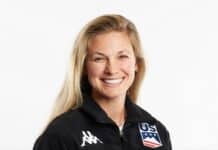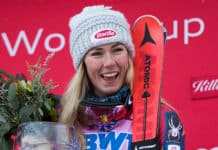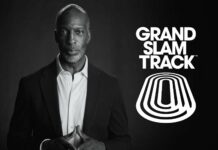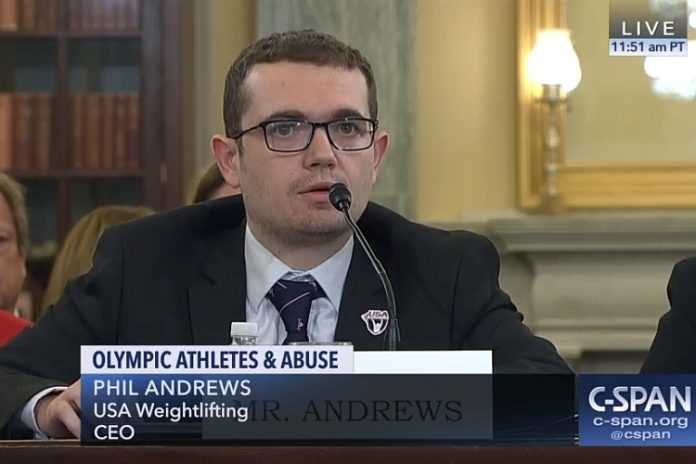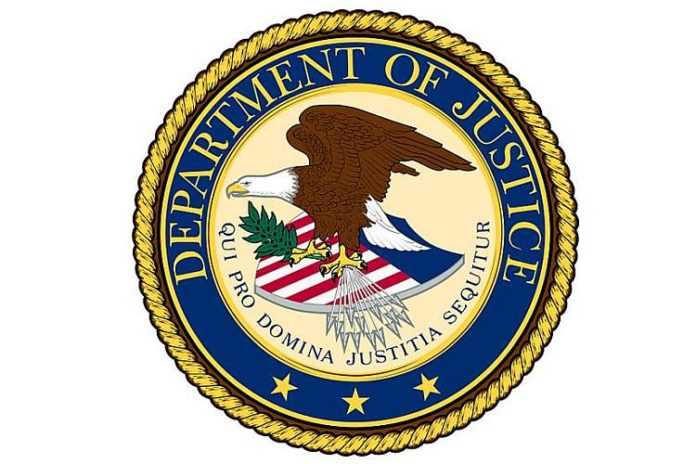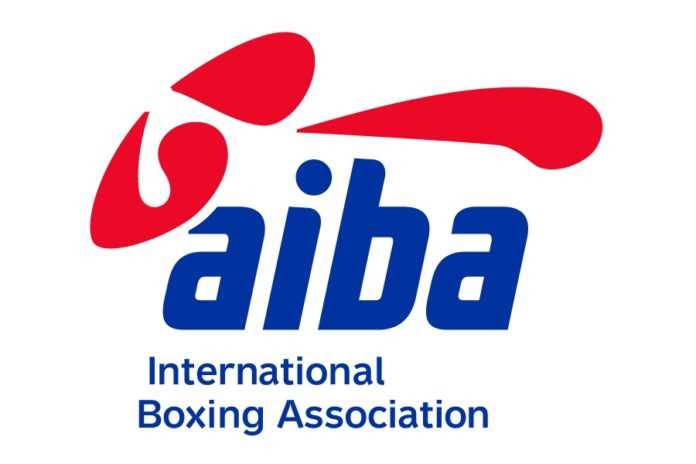Should athletes run the sports they participate in?
The key exchanges of Wednesday’s fourth hearing on “Protecting U.S. Amateur Athletes: Examining Abuse Prevention Efforts Across the Olympic Movement” before the U.S. Senate Sub-Committee on Consumer Protection, Product Safety, Insurance, and Data Security came near the end of the session with Sen. Richard Blumenthal (D-Connecticut) asking four heads of U.S. National Governing Bodies that question directly:
Blumenthal:
“Would you voluntarily commit to increasing athlete representation to a majority on your Boards and Committees to ensure their voices and concerns are heard?”
Phil Andrews, chief executive of USA Weightlifting:
“I’d be happy to do that.”
Anne Cammett, president of U.S. Figure Skating:
“I think we’d like to research, that it’s not the majority. We could increase the minority.”
Blumenthal:
“Well it’s 20% now; I’m asking you to commit that it’s a majority.”
Cammett:
“We will not be able to do that at this time.”
Blumenthal:
“Why not?”
Cammett:
“Part of what you have to look at [is] learning and life experience that come with developing from a young person to an adult. We have many people that skated at a high level that are involved in that, but they have timed out for the maximum [number of years since competing]. I think you need a good balance. You need the life experience, the knowledge that comes from …”
Blumenthal:
“How about 50%?”
Cammett:
“We can explore that.”
Blumenthal:
“I’d like to hear back from you about that.”
Tim Hinchey, chief executive of USA Swimming:
“Our Board is made up from a House of Delegates from throughout the entire organization, a volunteer organization and we need to work with those by-laws to do that, but we would be in favor of having more athletes.”
Darrin Steele, chief executive of USA Bobsled & Skeleton, himself a two-time Olympian in Bobsleigh in the 1998 and 2002 Winter Games:
“I would not be in favor of that.”
Blumenthal:
“Why?”
Steele:
“Because it comes down to the competence of the Board. We certainly want the athlete’s voice, that’s crucial, but if athletes haven’t completed education, haven’t had … our Board members have to be successful in some other aspect of life, hopefully some specialty that we can use almost as a consulting situation.
“One of the issues that we do see with competing athletes that are on the Board is, the Board has to look at long-term strategy for the organization. A competing athlete is looking at four-year increments and it’s difficult to think about long-term strategy when you’re actually in the midst of competition. So, the voice is important, but to the extent they would be dictating the direction of the organization when they have short-term strategies and not life experience.”
This exchange was the latest and strongest exploration yet by Blumenthal, a former United States Attorney in Connecticut, of measures which could be included in a reform package of the Ted Stevens Olympic and Amateur Sports Act.
He adopted wholesale the requests made by United States Olympic Committee Athletes Advisory Counsel chair Han Xiao (a former table tennis player) at the 24 July hearing for an independent Inspector General over the USOC and Athlete’s Advocate within the USOC. Blumenthal asked all four witnesses if they supported these concepts and they unanimously agreed.
He got some pushback on his athlete-majority idea; the reference by Cammett to former athletes being “timed-out” refers to the current USOC by-laws (§5.6) which define an “athlete” for the purposes of being on the Board or a USOC Committee for an “athlete” position as requiring an “athlete who has competed as a member of a United States national team in the Olympic, Pan American or Paralympic Games, or other major amateur international competition, within the ten (10) years preceding the date when he or she starts serving as a member” of the Board or committee.
But it shows the direction that Blumenthal is willing to go toward to reform the situation which led to the Larry Nassar sex-abuse scandal in gymnastics and those in other sports. It’s impossible to know whether the Sub-Committee will adopt any of these, as only five of the 17 members of the Sub-Committee showed up during the hearing. Chair Jerry Moran (R-Kansas) was much more circumspect during his questioning.
The star of the hearing was the British-born Andrews, who became chief of USA Weightlifting in 2016, after having worked in the organization since 2013. He made a powerful opening statement, which included:
“Creating an athlete-focused culture should be at the heart of every NGB. We’re not alone in our desire to create an athlete-focused culture and I would like to recognize USA Swimming, whose national team and members of their athlete community spoke to all NGBs about their positive culture just two days ago.
“Culture is complex, but its heart is about listening and creating trust. I am pleased to hear that in common with USA Swimming, we make nothing mandatory for our athletes, and, in our case, our athletes have the final say on things like selection procedures, making the athletes truly the heart of what we do. …
“While the Center [for SafeSport] is in the need for more resources, to that end, USA Weightlifting quadrupled our funding in common with the NGBs as a whole, doubling [NGB] funding for the Center to meet the needs for investigations across the country. We have developed a great and independent relationship with the U.S. Anti-Doping Agency, which benefits from significant federal funding to support its independent work. I call upon members of Congress to support the Center likewise and further the independent nature of the Center by giving it the support it truly needs to do the job we all would like it to do.
“In moving on to our leadership within the Olympic Movement, the U.S. Olympic Committee, I’d like to say that winning is not a bad thing. America’s public, when we go to the Games, expects us to win. We will cheer when we see the heroes of the Olympic Movement, who are there and speak to the need to participate in sport and speak to athletes and inspire other athletes to participate in sport, and that might just be at the local level.
“But it’s about doing it the right way. And that’s where I think we are moving towards now. It’s winning in the right way, winning in an athlete-focused manner. I commend Susanne Lyons to be the president of the U.S. Olympic Committee. Susanne has shown a commitment to our athletes, a willingness to listen to both National Governing Bodies, athletes – most importantly – and other stakeholders in the Olympic Movement.”
He also added late in the hearing a noteworthy comment that “None of us in this room can promise that sexual abuse will not happen again. It’s impossible to promise that. What is critical is how we respond: how we respond to our athletes and how we respond to an individual coming forward with a report. I think not only how we respond to that from an investigation standpoint, but how we respond to that for the care of the athlete, namely … mental health and counseling — rather than sports psychology — counseling for those athletes is a very vital service that many NGBs and the U.S. Olympic Committee are now looking to implement.”
The other witnesses also contributed to a picture of a new program of athlete support which includes not only event training, equipment, health, nutrition, sports psychology, sport science and travel support, but also safety, security and mental health and wellness assistance. But the level of support varies greatly by NGB; the four represented at the hearing had 2017 revenues of:
∙ $ 3.8 million USA Bobsled & Skeleton
∙ $ 6.1 million USA Weightlifting
∙ $24.8 million U.S. Figure Skating Association
∙ $43.6 million USA Swimming
Hinchey noted that USA Swimming Board of Directors had just approved a $1.5 million appropriation to the NGB’s SwimAssist program, defined as “USA Swimming’s assistance fund for survivors of abuse.”
Cammett also pointed to her written testimony, which noted that “at some point in the near future, expand the reach of the U.S. Center for SafeSport. Athletes within the jurisdiction of national governing bodies represent only a small segment of youth sports participants in the United States. A full commitment to ending abuse in sports must include children who participate outside the auspices of the U.S. Olympic movement.” This is obvious, of course, but unlikely to be approached in any legislation in view of certain opposition from the professional sports organizations in the U.S.
At this point, it’s impossible to gauge what will happen with the Congress and the Ted Stevens Olympic and Amateur Sports Act. November’s midterm elections will have a major impact on the future; if the Democrats take control of the Senate, then Blumenthal will have a pathway forward to promote the changes he seeks. As it is, Wednesday’s hearing produced a promise from Andrews to voluntarily make “athletes” a majority in USA Weightlifting’s Board and committees (we’ll see if his current Board agrees) and from Hinchey to increase minimum “athlete” representation from the currently-required 20% to some higher figure.
Blumenthal’s push is an overreaction to the sex-abuse crisis, and putting athletes in charge of their sports is hardly a certain pathway to peace and tranquility. It’s worth noting that the current funding level of Olympic sports in the U.S. is mostly due to the USOC’s share of the International Olympic Committee’s revenues from American television rights and TOP sponsorships.
That arrangement is a direct result of the efforts of John Krimsky, who headed the USOC’s marketing efforts from 1986-99, but pled guilty to child pornography offenses in 2008. Is the Congress going to require the USOC to give those funds back?
Rich Perelman
Editor







